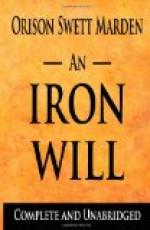“One day,” said a noted rope-walker, “I signed an agreement to wheel a barrow along a rope on a given day. A day or two before I was seized with lumbago. I called in my medical man, and told him I must be cured by a certain day; not only because I should lose what I hoped to earn, but also forfeit a large sum. I got no better, and the doctor forbade my getting up. I told him, ’What do I want with your advice? If you cannot cure me, of what good is your advice?’ When I got to the place, there was the doctor protesting I was unfit for the exploit. I went on, though I felt like a frog with my back. I got ready my pole and my barrow, took hold of the handles and wheeled it along the rope as well as I ever did. When I got to the end I wheeled it back again, and when this was done I was a frog again. What made me that I could wheel the barrow? It was my reserve will.”
“What does he know,” asks the sage, “who has not suffered?” Did not Schiller produce his greatest tragedies in the midst of physical suffering almost amounting to torture? Handel was never greater than when, warned by palsy of the approach of death, and struggling with distress and suffering, he sat down to compose the great works which have made his name immortal in music. Beethoven was almost totally deaf and burdened with sorrow when he produced his greatest works. Milton writing “Who best can suffer, best can do,” wrote at his best when in feeble health, and when poor and blind.
“... Yet I argue not Against Heaven’s hand or will, nor bate a jot Of heart or hope; but still bear up and steer Right onward.”
The Rev. William H. Milburn, who lost his sight when a child, studied for the ministry, and was ordained before he attained his majority. He has written half a dozen books, among them a very careful history of the Mississippi Valley. He has long been chaplain of the lower house of Congress.
Blind Fanny Crosby, of New York, was a teacher of the blind for many years. She has written nearly three thousand hymns, among which are: “Pass Me not, O Gentle Saviour,” “Rescue the Perishing,” “Saviour More than Life to Me,” and “Jesus keep Me near the Cross.”
“The truest help we can render one who is afflicted,” said Bishop Brooks, “is not to take his burden from him, but to call out his best energy, that he may be able to bear.”
What a mighty will Darwin had! He was in continual ill health. He was in constant suffering. His patience was marvellous. No one but his wife knew what he endured. “For forty years,” says his son, “he never knew one day of health;” yet during those forty years he unremittingly forced himself to do the work from which the mightiest minds and the strongest constitutions would have shrunk. He had a wonderful power of sticking to a subject. He used almost to apologize for his patience, saying that he could not bear to be beaten, as if it were a sign of weakness.




